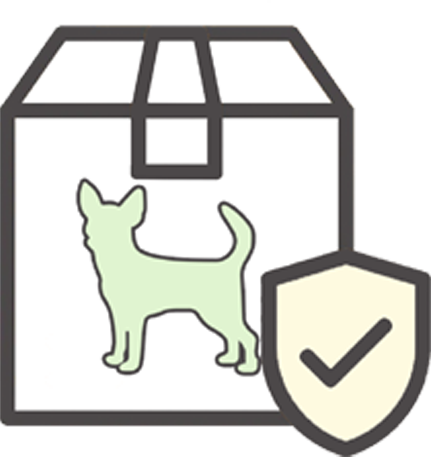Common Behavior Changes and Cognitive Problems in Senior Dogs
Friday, February 22, 2019 05:49:59 PM America/Los_Angeles
Just like humans, older dogs may experience changes in their behaviors or cognitive losses. The good news is, dogs often deal with these changes better than many people do. Dogs naturally show an age-related decline in their mental function at about six years of age; however, it isn’t typically noticeable until they are older. Studies on older dogs have shown that it may be possible to counteract decline in cognitive issues by providing a quality enriched environment, such as providing social interactions, introducing new learning tasks and supplying “learning” toys. Each of these things helps individually, but for the best results, all of them should be used together. The longer you provide new stimuli; the better it will be for your older dog to adjust to their aging environment. Your older dog may not be as active as they were before, but they still need stimulation. For example, dogs are creatures of habit, so something as simple as an indoor potty for dogs or DoggieLawn allows your older dog to have the same experience of going to the bathroom in the grass outdoors. Not only will this help with accidents, but reminds them of previous trained behaviors. Here are some of the behavior and cognitive changes to be aware of in older dogs.
Common Behavioral Changes in Older Dogs
Aggression
Even dogs that are normally gentle may suddenly become aggressive as they age due to the changes in their body. Aggression may also be the result of a medical problem, such as dental disease or arthritis, so if your older dog is suddenly showing signs of aggression, the first thing to do is check to see if they are in pain. If you discover that your dog’s aggression may be related to pain, be sure to take them to the vet to find out the underlying cause. Some other common behavior changes in aging dogs may include:
- Loss of vision and/or hearing, which results in your dog being easily startled
- Reaction to certain medications
- Diseases that directly affect their nervous system, such as cognitive dysfunction
- Physical pain, such as painful joints from arthritis or dental problems
- Increased stress
Separation Anxiety
Dogs with separation anxiety become very anxious when they sense their owner is about to leave. When you do leave, your older dog may become destructive, howl or bark, urinate or defecate outside of their grass potty pads and may salivate profusely. Dogs with separation anxiety will also be overly excited when you return home. Older dogs often have a decrease in their ability to cope with changes in their routine. Vision and/or hearing loss may also make them more anxious, especially when separated from you.
Inappropriate Elimination
Some older dogs, even those who have been housetrained for years may gradually forget their potty training habits. There may be a number of reasons for this change in their behavior, including medical conditions that often occur with aging, such as inflammatory bowel disease, inflammation of the prostate or kidney disease. Aging dogs with inappropriate elimination should be thoroughly examined by their veterinarian. When going to the veterinarian for housetraining issues, you will need to provide the vet with a range of history and information about your dog’s soiling problem, including changes in their eating or drinking habits, their posture while eliminating and whether the accidents tend to only occur when you are gone.
Medical conditions should be treated promptly and appropriately. If arthritis or other painful movements are involved, you may want to consider installing a ramp to the outside so your dog doesn’t need to maneuver stairs. If the problem occurs while you are away, consider finding a pet sitter who can take the dog outside at varying intervals. If using pee pads, be sure to change the pads frequently to avoid the risk of the dog eliminating outside of the pad in order to avoid soiled pads. Better yet, provide your dog with a real grass dog potty so you don't have to worry about constantly changing out the pads.

Cognitive Dysfunction
Unfortunately, more than half of all dogs age 10 years and older will experience some cognitive dysfunction. Some signs and symptoms of cognitive dysfunction in your aging dog may include:
- • Disorientation or confusion-For example, your dog may get lost in their own back yard or get trapped behind furniture or in corners.
- Change in sleeping patterns, including being awake all night
- Pacing for long periods at a time
- Decrease in activity level
- Not recognizing family members or friends
- Decrease in attentiveness
- Staring into space
- Loss of housetraining abilities (may not remember where they normally urinate or defecate)
By Holly Michele via shutterstock
It is important to keep in mind that many of the changes in your dog’s behavior and even in their cognition, may be due to a medical condition. If your dog’s behaviors are changing, regardless of how quick or how delayed the changes occur, it is important to have your aging dog examined by their veterinarian. Older dogs can become easily stressed, which can lead to further health problems, so it is essential that you attempt to reduce their stress by making any necessary changes in their routine. With understanding, patience and the appropriate treatments recommended by the vet, you can help to make sure your dog’s senior years are a quality time for both of you.

